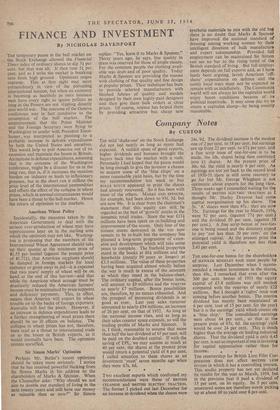FINANCE AND INVESTMENT
By NICHOLAS DAVENPORT
THE temporary pause in the bull market on the Stock Exchange allowed the Financial Times index of ordinary shares to dip 31 per cent. but that was all. It then rose 51 per cent. and as I write the market is breaking into fresh high ground. Optimism reigns supreme. This at first sight may seem extraordinary in view of the prevailing international tension, but when an economy is booming as healthily as ours business men have every right to ignore politics as long as the Powers are not slipping directly into world war. The outcome of the Geneva conference was in fact conducive to the resumption of the bull market. The announcement that the Prime Minister and the Foreign Secretary were flying to Washington to confer with President Eisen- hower , was interpreted as pointing to a probable increase in defence expenditures by both the United States and ourselves. This would help to pull America out of its recession and maintain the boom in Britain. An increase in defence expenditures, assuming that is the outcome of the Washington conference, might be a disaster for us in the long run, that is, if it increases the taxation burden on industry or leads to inflationary pressure, but in the short run it stiffens the price level of the international commodities and offsets the effect of the collapse in wheat prices, which in normal circumstances would have been a threat to the bull market. Hence the return of optimism to the markets.
American Wheat Policy
Incidentally, the measures taken by the American Government to deal with the serious over-production of wheat may have repercussions later on in the sterling area which the optimists may not like. Washing- ton is proposing that the members of the International Wheat Agreement should take up their quotas at the minimum price of $1.55 per bushel (against the present price of $1.721), that American surpluses should be dumped in foreign markets for local currency or given away in aid—it is expected that two years' supply of wheat will be on hand at the end of this harvest—and that While the American wheat acreage must be drastically reduced the American farmers' income must be maintained by price supports and deficiency payments. This, in effect, means that America will export its wheat trouble on to the backs of foreign exporters. Australia will feel the pinch. However, if an increase in defence expenditures leads to a further strengthening of wool prices there should be no ill effects on balance. The collapse in wheat prices has not, therefore, been read as a threat to international trade or to the boom in British exports, as it would normally have been. The optimists remain unruffled. replies: "Yes, leave it to Marks & Spencer." Thirty years ago, he says, fine quality in dress was reserved for those of ample means. For the common people the clothing avail- able was drab and of poor quality. Today Marks & Spencer are providing the masses with clothing of fine quality and fine design at popular prices. Their technique has been to provide selected manufacturers with finished fabrics of quality and models designed by their own highly-paid designers and then give them bulk orders at close prices. Of course, science has helped them by providing attractive but cheap new synthetic materials to mix with the old bu$ there is no doubt that Marks & Spencer have improved the national standard of dressing among working women by their intelligent direction of bulk manufacture and expert salesmanship. Provided full employment can be maintained Sir Simon can see no bar to the rising trend of the British standard of living. But full employ- ment depends on full exports and, as 1 have lately been .arguing, lavish American 'off- shore' expenditures on defence and the costly local wars must not be expected to remain with us indefinitely. The Communist world will not always let the capitalist world enjoy boom conditions because of its political ineptitude. It may some day try to create a capitalist slump—by being sweetly reasonable.


































 Previous page
Previous page